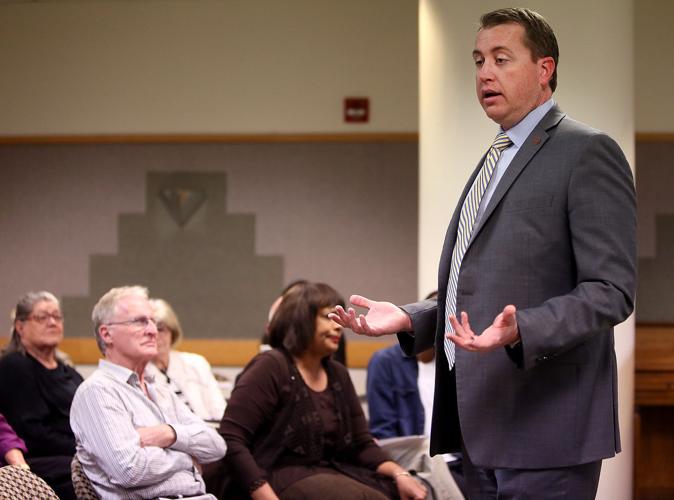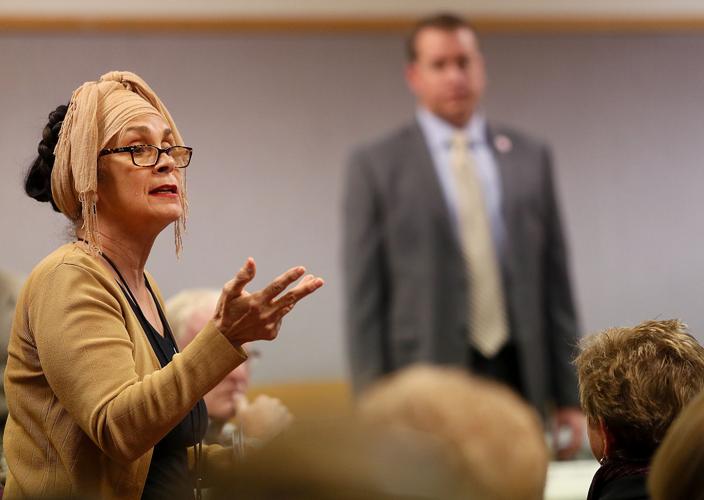A plan to draw more money from the Arizona state trust land endowment to fund education is fiscally irresponsible and threatens the future of the trust and education funding, according to Arizona State Treasurer Jeff DeWit.
“We need to send it back to the drawing board,” he said at a forum hosted by the Metropolitan Education Commission. More than 100 people packed the conference room at the Joel D. Valdez Main Library downtown for the forum, on Proposition 123.
The proposition is to be voted on in a special election May 17. It stems from a lawsuit filed by several Arizona school districts and education groups over the state’s failure to fund inflation adjustments.
The proposition, if approved, would give an extra $3.5 billion to the state’s schools over the next 10 years. It would also provide $50 million annually over the next five years and $75 million annually for five years after that. Passage would also settle a five-year-old lawsuit over inflationary funding for schools.
Prop. 123 would boost K-12 education’s distribution rate from the state land trust from 2.5 to 6.9 percent for the next 10 years.
It would also fund inflation in perpetuity, unless the state goes into an economic recession, the land trust’s balance is lower than the prior year’s or education funding distribution from the general fund reaches 49 percent. When those triggers are hit, inflation funding would be suspended.
At the forum DeWit said the right thing to do is solve the problem by using the state’s surplus of about $300 million, $250 million of which he said the Joint Legislative Budget Committee has certified as sustainable in coming years.
“Why don’t we use this?” he said. “We don’t have to use a taxpayer-funded election.”
Arizona’s schools are the largest beneficiary of the land trust, which is worth about $5 billion, he said. The Legislature is taking what already belongs to schools and giving it to them. Increasing the distribution rate has the effect of taking money from future students, he said.
In 10 years, the politicians who crafted and backed this proposition will not be around to face the consequences when the trust “blows up,” he said.
“But I’m going to be here,” he said. “My kids are going to be here. We’re all going to pay taxes in 10 years.”
DeWit played an audio clip of what he said was the Arizona School Boards Association’s message of Prop. 123, which said the money gets handed to schools without accountability or policy constraints.
He pointed out that the proposition allows for the money to be put into districts’ general funds, instead of the classroom site fund, which would be the most direct way to help students and teachers immediately.
Jason Freed, president of the Tucson Education Association, spoke in favor of the proposition, saying the money must come now.
“Right now, if I’m struggling and I don’t have enough money and I have something to sell, I’m going to sell it,” he said of the state trust lands.
If Prop. 123 were to be struck down, DeWit said the schools would still have the lawsuit to count on.
Several audience members voiced concerns about how long they would have to wait for the lawsuit to be resolved and money be given to schools if the proposition were to fail.
“If we do not get the money now, we will not get it for another five or six years,” said Alan Storm, superintendent and CEO of the Pima County Joint Technical Education District.
DeWit said he did not think it would take that long, adding that the plaintiffs and the state have already gone through a long legal process.
Norma Jean Higuera Trask, a teacher in the Sunnyside Unified School District, spoke against Prop. 123.
“I’m willing to wait,” she said, saying she hopes for a better resolution than the funding plan the proposition offers.





